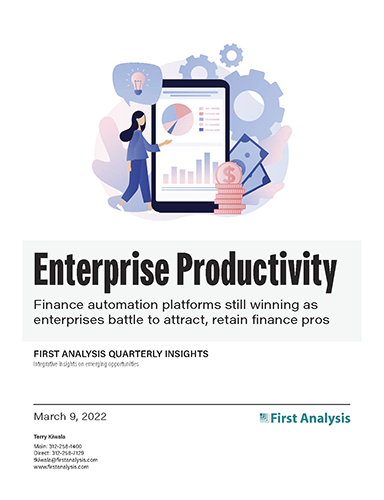Quarterly insights: Enterprise productivity
Finance automation platforms still winning as enterprises battle to attract, retain finance pros

There is a drought of finance talent across roles and levels, from entry-level to chief financial officer, amidst strong demand.
Besides increasing compensation, talent-starved enterprises can compete by making finance roles more intrinsically rewarding with financial automation platforms that enable finance professionals to spend more time on tasks that involve human judgment and creativity.
Even ignoring the need to attract finance talent, enterprises see many compelling reasons to invest in financial automation tools. Prominent among them is reducing risk and cost of business disruption due to employee turnover.
Platforms that deliver significant value to finance departments include accounts payable and receivable automation and expense management. We highlight several innovative companies in these and related areas.
TABLE OF CONTENTS
Includes discussion of BILL, BL, COUP, EXFY and 12 private companies
- Finance pros are in short supply
- “What kind of automation package do you offer your employees?”
- Increasing efficiency underpins financial automation adoption
- Some key financial automation platforms
- Shift toward more comprehensive solutions likely means increased transaction activity
- Cell and gene therapy
- A thriving sector becoming more so
- First Analysis Enterprise Productivity Index ends flat
- Enterprise productivity M&A pace continues to slow
- Enterprise productivity private placement pace remains solid
Finance pros are in short supply
The pandemic has exacerbated labor supply tightness across the economy, and the supply of finance pros has been acutely hit. There is a drought of finance talent across roles and levels, from entry-level to chief financial officer, amidst strong demand. Robert Half reported that 91% of senior managers in finance and accounting surveyed in 2021 said it’s challenging to find skilled finance professionals, with the most challenging areas being finance and financial planning and analysis, accounts payable, accounts receivable and bookkeeping, and budgets and analysis. The survey also reported 91% are concerned about valued employees on their teams leaving for new opportunities.
Three main factors underpin the tightness in finance talent, and all indications are that these factors will persist. The first two affect the supply of accounting and finance talent: accelerated boomer retirements during the pandemic and fewer people entering the finance field. On the demand side, hiring competition driven by venture capital and private equity firms has increased.

Request full report
To access the full report, please provide your contact information in the form below. Thank you for your interest in First Analysis research.
